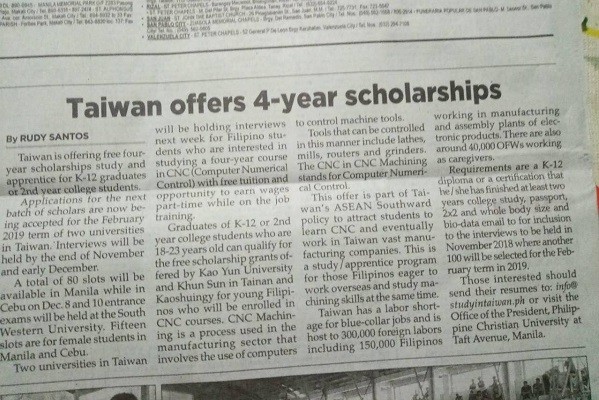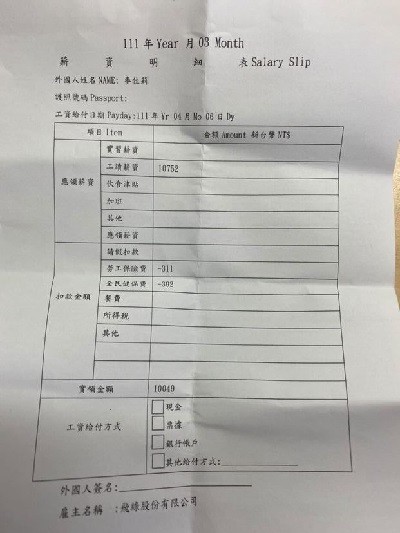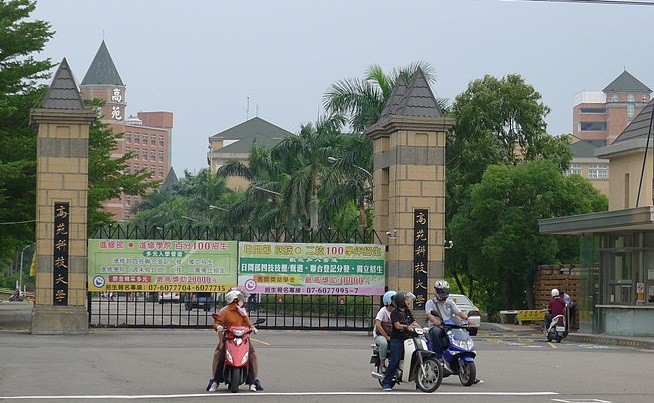TAIPEI (Taiwan News) — A legislator joined two NGOs Monday (May 6) to accuse Kaohsiung’s Kao Yuan University (KYU) of luring students from developing countries to do internship programs, only for many to end up working arduous factory jobs unrelated to their studies in order to remain in the country.
Two KYU seniors recruited from their alma mater, Philippine Christian University, to participate in a work-study program described their experiences to Taiwan News on condition of anonymity.
Both students said they have worked at six factories in northern Kaohsiung and Tainan since arriving in Taiwan in the fall of 2018.
Their duties involved packaging, grinding, cleaning, and even welding — despite lacking prior experience. They and other Southeast Asian workers were required to clean the restrooms after their shifts.
One of the students, nicknamed Lily, said that while employed at a factory owned by fastener manufacturer NES, she was the only female machine operator in the production department. “Every day I needed to bend and press the metals,” she said.
She added that she was only provided one pair of gloves every two weeks. However, they would be in tatters after two days and she would tape up her hands in an effort to protect them.
It was dirty work, and the factory was stifling, Lily said. When she brought an electric fan to work, it was taken away; only the Taiwanese employees were allowed fans, she and the other student recounted.
It was also hazardous. Lily recalled that one of her coworkers lost a finger in her machine. Compounding the risk was the 2,000 pieces-per-hour quota. She said from day one she was expected to meet 60% of this quota, a feat she would often have to labor until midnight to accomplish; she said she was not paid overtime.
Under pressure to work faster, Lily said that after she damaged two machines when she inserted the metal pieces incorrectly, the factory deducted the cost for repairs from her salary.
When Lily lost her job during Taiwan’s first major outbreak of COVID-19 last summer, her advisor gave her a failing grade for her internship, though she had no alternative employment options at the time. It was not until last month, once the Ministry of Education started investigating the school, that she was given a chance to substitute the internship with two classes, according to a ministry official.
The other Filipino student, said the dirt and metal dust at a previous factory where he was a welder gave him eczema. Yet he continued to weld so he could make tuition payments. “We came here to study and have a degree, it seems like we’re cows milked by them. They just care about our money,” he said.
These and other Southeast Asian students Taiwan News spoke to have been working 40 hours per week, and often more, starting in their second year. They are then expected to attend classes at 8 a.m. the next day.
According to Taiwan’s Employment Service Act, foreign students are only allowed to work a maximum of 20 hours of work per week.
In an apparent effort to get around this, the school labeled 20 of those hours as their “internship,” though the work does not change throughout the day. Taiwan News has obtained audio of a Taiwanese man, who it is claimed is a school official, telling students how to explain this 20-20 division if they are contacted by Ministry of Labor officials.
Another Filipina student provided Taiwan News with both her “real” payment receipt and a “fake” one she said KYU officials had given her. Another student has provided Taiwan News with images of two separate debit cards, which they say were given to them by the school to maintain the appearance of legal hours and a six-credit “internship,” which the factories grade per an arrangement with the school.
“It’s like a facade, like a cover-up,” one male student in his final year said of the internship. He said Kao Yuan had not mentioned such an internship before he left Manila for Taiwan and added that it’s unusual for a student to undergo an internship before their final year.
The Philippine students at Kao Yuan are recruited by JS Contractor Inc., a human resources company operating out of Manila and Cebu. Students said they were told they could stay in the dormitories for free and pay their way through school by working.

Nov. 12, 2018 Philippine Star article on KYU, Kun Shan University scholarships. (Taiwan News screenshot)
Lily, the male student, and other students were the first batch of students accepted into the program in the summer of 2018. However, it was not until shortly before leaving to start the fall semester at KYU that they were told they needed to pay about NT$63,000 in fees.
By then, the pair said they had already committed to the trip. According to copies of Lily’s receipts she paid the amount in monthly increments of NT$3,530 to Family Financial Management Consultant LTD., based in Taipei’s Zhongshan District.
However, some students working in similar situations view their experience in Taiwan as an opportunity to get an education, one they would not have back home. One Filipina senior getting her IT degree at another Taiwan university said that while the factory work is difficult, it is an opportunity she would not have had back home, and she plans to stay to pursue her master’s.
Asked about the situation, KYU President Jaw Bih-shiaw (趙必孝) wrote a letter questioning the legitimacy of the information provided by the students. Furthermore, “When our companies learned of (a student’s) statements, they utterly denied the accusations.”
Jaw claimed “biased reports” could deprive Filipino students of a “once-in-a-lifetime” opportunity to improve their prospects.
Attached to the letter were statements from several students about the benefits of the apprenticeship program, with some stressing their eight-hour shifts comprise a legal four-hour part-time job and a four-hour internship. According to Taiwan News’ sources, the students were asked to pen the statements after the KYU administration heard this agency’s article.
Friday morning (May 6), Legislative Yuan member Fan Yun (范雲), Taiwan Association of Human Rights Secretary General Shi I-hsiang (施逸翔), and Taiwan Labor Front Association Secretary General Sun Yu-lien (孫友聯) held a press conference on the situation at KYU after a student reached out to them. They discussed the alleged illegal hours, forged pay slips, high student-teacher ratio, and misleading advertising, among other issues.
“Ministries and associations should work together to do a good job checking and stop allowing Taiwan’s higher education policy to become a black hole in human rights,” Legislator Fan, Shi, and Sun, said in a joint press statement Friday.
The controversy around Kao Yuan echoes that of Chung Chou University, which earlier this year made headlines for forcing Ugandan students to work long shifts in factories as “interns.” Similar incidents in recent years include Eswatini student laborers from MingDao University and Sri Lankan students at the University of Kang Ning employed in slaughterhouses in 2018.
A growing number of Taiwan universities are facing enrollment shortfalls as the country’s birth rate continues to plummet, and foreign students are one way to shore up student numbers.
TAHR head Shi I-hsian, Legislator Fan Yun, and TLFA Secretary General Sun Yu-lien. (Taiwan News photo)

Alleged fake salary slip. (Student photo)


